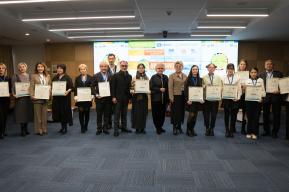Article
UNESCO supports consultations in Colombia to increase the understanding of the local impact of online harmful content on freedom of expression and other fundamental rights

Organized with the Foundation for Press Freedom (FLIP), the consultations took place online between February and March 2023 and were held with women journalists, Afro-Colombian community representatives and indigenous communities’ representatives.
Social media enable the spread of new voices and increased participation of various local communities in public debate in Colombia (...) But harmful content that circulates on social media is at the same time most often directed at the members of these vulnerable groups in the country and most prevalent during politically relevant periods. That is why it was important to hear from representatives of various groups how much harmful content prevents them from fully benefiting from social media and new digital communication technologies.
The participants of the consultations explained how harmful content affects their lives beyond the online world. “Hate speech does not constitute simple opinions. It rather produces concrete effects on people's lives, mental health, and society’s perceptions and stereotypes,” said Diana Quigua, a researcher at the Center for the Study of Justice and Society, speaking from her experience as a member of the indigenous Kubeo community. "Being targeted by hate speech is like living in a double dimension. I do not stop living the violence by turning off my cell phone,” said Sher Herrera, a journalist at the Volcánicas online platform and a member of the Afro-Colombian community.
The discussions also highlighted that it is not necessary to be directly targeted by hate speech and disinformation to be affected by it.
When you see certain comments online, for instance, about the physical appearance or bodies of black women, you pick them up as if they were about you, they implicate you in such forms of treatment.
The consultations also shed light on certain issues related to the moderation of content on social media platforms, in particular when it comes to journalistic content. “Our account has been blocked in the past and we had experience with platforms taking down our news items,” said Erica Londoño, a journalist at the Caracol Radio Guaviare. “The problems here start already with the fact that most platforms communicate in English, so you have to reply to claims reported by users relying on a translator.”
The input from vulnerable groups and individuals collected through consultations was conducted in parallel with the research about the regulatory framework for dealing with harmful content in Colombia, conducted by FLIP, as well as the implications of self-regulatory tools and content moderation policies of platforms, led by Fundación Karisma and Article 19.
In Colombia, the implementation of the project “Social Media 4 Peace” started in September 2022 and the project was officially launched on 23 November in a national hybrid event organized in Bogotá. The recording of the event is available here. The final version of the research being conducted within this project will be published in the coming weeks and will be showcased in a roundtable discussion with regional actors in a side event during the UNESCO World Press Freedom Day Conference in New York. It is expected that these documents will contribute to the discussions on issues of online content moderation in Colombia and more broadly in Latin America.








